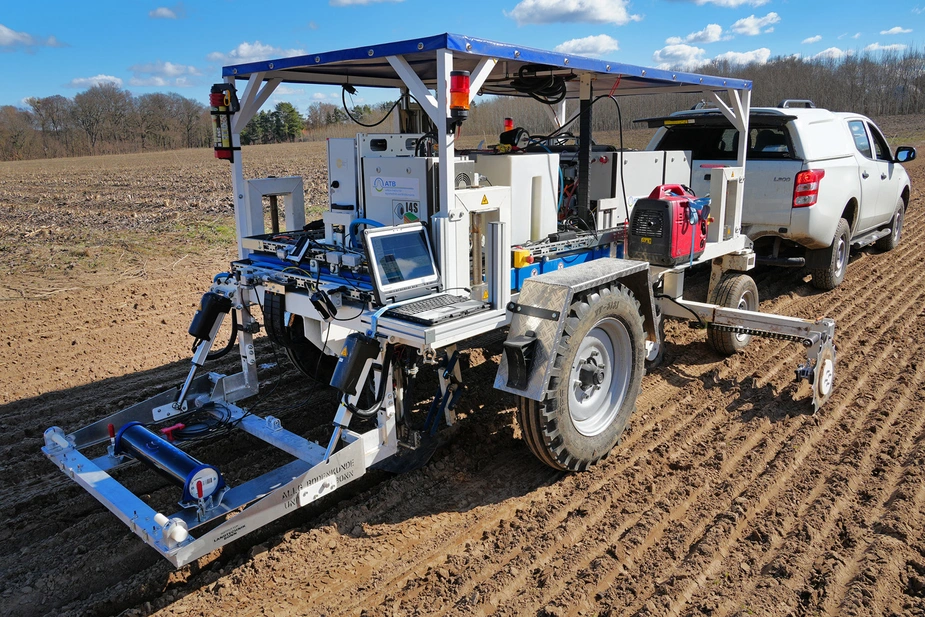Efficient soil analysis – high-tech for sustainable agriculture
Mobile sensor platform from Leibniz Institutes ATB and FBH can precisely detect the composition of soil on the move
Precise information about agricultural soils is key to managing them more efficiently and sustainably. Researchers at the Leibniz institutes FBH and ATB have recently enhanced an existing sensor platform for mobile soil mapping of agricultural fields. By integrating an innovative Raman system, soil components can now be identified on a substance-specific level while the vehicle is on the move – in real time, on site, and with high spatial resolution. This method holds the potential to significantly reduce time and cost associated with conventional soil sampling. At the same time, it enables more targeted fertilization, contributing to more environmentally friendly farming practices.
To manage their fields effectively, farmers need precise information about nutrients, pH levels, and other key soil parameters. Soil composition varies not only across different areas but also at different depths. For optimal cultivation, agriculturists depend on detailed maps that show exactly which properties are present in which parts of the field. Currently, this information is obtained by taking soil samples and analyzing them in the lab – a time-consuming process. Only after receiving the results can farmers apply the nutrients that are actually needed.
High-tech tools for rapid soil analysis and targeted fertilization
The recently tested mobile sensor platform opens up new possibilities. RapidMapper – a high-tech platform for soil mapping developed at the Leibniz Institute for Agricultural Engineering and Bioeconomy (ATB) – has been enhanced with a technological solution from the Ferdinand-Braun-Institut (FBH). As part of the BMBF-funded project Intelligence for Soil (I4S), led by ATB, researchers at FBH developed a portable Raman measurement system for on-site soil analysis. This system enables fast and spatially resolved detection of the molecular composition of soil. It uses Shifted Excitation Raman Difference Spectroscopy (SERDS), which is based on a dual-wavelength Y-diode laser specially developed at FBH. This approach allows Raman signals to be efficiently separated from disturbing influences such as ambient light or fluorescence.
The novel SERDS system was integrated into ATB’s RapidMapper and successfully used in initial field tests. Dr. Martin Maiwald, head of the Laser Sensors Lab at FBH, who developed the system together with the institute’s in-house Prototype Engineering Lab, explains: “Using the Raman sensor head, which was integrated into the existing probe and lowered into the topsoil during traversal, it was possible for the first time to detect soil components at a depth of five to ten centimeters with SERDS – while in motion.” FBH also developed dedicated software to control the system and continuously record measurement data – Raman spectra along with the corresponding GPS coordinates.
Traditional soil sampling involves collecting samples from multiple locations and sending them to a laboratory for analysis. In the future, the sensor system could perform this process directly in the field – more quickly, efficiently, and cost-effectively than conventional sample testing. The SERDS module adds important parameters to the RapidMapper’s capabilities, says Dr. Robin Gebbers, agricultural scientist at ATB: “Until now, our research platform could capture pH values, humus content, and soil texture. With the newly integrated SERDS spectroscopy, we aim to gain additional insights – for example, into carbonates and various organic substances in the soil.” Dr. Gebbers is optimistic: “The first test run was a big step forward. At our soil testing track in the Fieldlab for Digital Agriculture, we were able to demonstrate that SERDS measurements in soils are possible from a mobile platform while in motion.” The data collected during this test is currently being evaluated.
Next steps toward comprehensive soil mapping
The I4S project partners are already working on their next objective: an integrated system designed to enable optimal and environmentally sustainable management of soil fertility directly in the field. This would make it possible to map agricultural land more comprehensively than before. Developments are aimed at a wide range of users – including agricultural service providers, farmers, machinery manufacturers, and others who rely on detailed soil data.
Further information:
- Video of the mobile sensor platform with integrated Raman system in action (Youtube link)
- Project at the ATB website (i4s.atb-potsdam.de)
- Project at the website of the funding initiative BonaRes (bonares.de)
- Raman Measurement Systems at the FBH website (fbh-berlin.de)
Scientific contacts:
Dr. Robin Gebbers
Leibniz Institute for Agricultural Engineering and Bioeconomy (ATB)
+49 331 5699-413
rgebbers(at)atb-potsdam.de
Dr. Martin Maiwald
Ferdinand-Braun-Institut (FBH)
+49 30 6392-2651
martin.maiwald(at)fbh-berlin.de
Press release ATB&FBH, 2 April 2025
